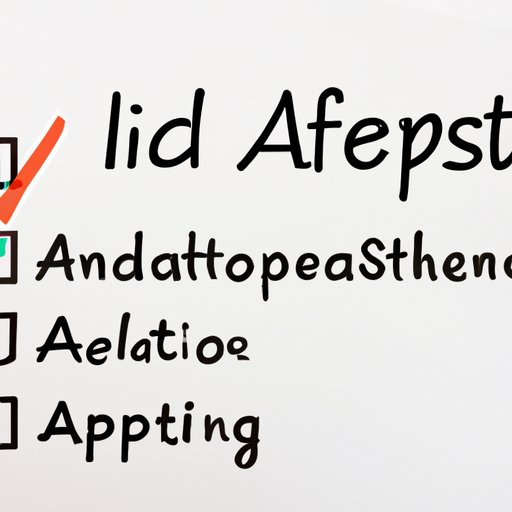
Introduction
ADHD is a neurodevelopmental disorder that impacts millions of people worldwide. It is characterized by a combination of symptoms, including inattention, hyperactivity, and impulsivity, that can affect individuals of all ages. However, ADHD often goes undiagnosed or misdiagnosed due to a lack of awareness of its symptoms.
Understanding the symptoms and signs of ADHD is essential for early diagnosis and effective management. This article will explore ADHD symptoms, self-assessment tools, consulting with a doctor, personal stories of diagnosis and treatment, myths and misconceptions, and using cognitive testing to help diagnose ADHD.
Symptoms of ADHD: Things You Might Notice About Yourself
The symptoms of ADHD can vary in severity and type, depending on the individual. Inattention symptoms include difficulty staying focused, forgetfulness, and organization problems. Hyperactivity symptoms refer to fidgeting, restlessness, and an inability to sit still. Impulsivity symptoms manifest as interrupting others, speaking out of turn, and engaging in risky behavior.
While many people associate ADHD with children, approximately 60% of those who have ADHD continue to experience symptoms into adulthood. Adult ADHD symptoms may include chronic lateness, forgetfulness, difficulty prioritizing tasks, and trouble following through on commitments.
ADHD symptoms can impact daily life, affecting relationships, work productivity, and more. Understanding the symptoms is the first step in managing them.
Taking a Self-Assessment for ADHD: What You Need to Know
If you suspect you have ADHD, taking a self-assessment test can help you better understand your symptoms. Self-assessment tests can be found online and can provide an indication of whether further testing for ADHD is necessary.
However, it is important to note that self-assessment tests should not replace a professional diagnosis. Consulting with a healthcare provider is essential for an accurate ADHD diagnosis.
Consulting with a Doctor About ADHD: What to Expect
Seeking a professional diagnosis is essential for effective management of ADHD symptoms. During a diagnostic assessment, a healthcare provider will review your medical history, discuss your symptoms in-depth, and conduct a physical exam. They may also use tests, such as cognitive tests, to help diagnose ADHD.
When selecting a healthcare provider for ADHD evaluation, it’s important to choose someone with experience in ADHD diagnosis and treatment. It’s also essential to feel comfortable discussing your symptoms openly and honestly with your provider. Doing so will help them better understand your individual situation.
Personal Stories of ADHD Diagnosis and Treatment
Personal accounts of ADHD diagnosis and treatment can be helpful in understanding the experiences of those living with ADHD. Many people with ADHD have faced challenges such as trouble with time management, impulsivity, and difficulties with relationships. However, there are strategies that can help manage these symptoms, such as medication, therapy, and lifestyle changes.
It’s important to remember that managing symptoms of ADHD is a journey, and individuals may need to try various approaches to find what works best for them.
Myths and Misconceptions About ADHD
Many myths and misconceptions exist about ADHD, which can lead to confusion around the disorder. For example, some may believe that ADHD is not a real condition or that medication is the only effective treatment. It’s essential to dispel these myths to reduce stigma and increase understanding of the disorder.
Using appropriate language when discussing ADHD is also important. Choosing stigmatizing language can have negative impacts on those with ADHD, and using accurate terminology helps reduce the misunderstandings surrounding the disorder.
Cognitive Testing and ADHD: What It Means and What It Tells You
Cognitive testing is a type of assessment that measures a person’s thinking abilities, such as attention and memory. While cognitive tests cannot diagnose ADHD alone, they can provide valuable information to healthcare providers when diagnosing the disorder.
There are different types of cognitive tests, such as Continuous Performance Tests (CPTs) and neuropsychological evaluations, that can assess different aspects of cognitive function. Understanding cognitive test results can help individuals and healthcare providers make informed decisions about management and treatment options for ADHD.
Conclusion
Understanding the symptoms and signs of ADHD is essential for early diagnosis and effective management. If you suspect you have ADHD, taking a self-assessment test can be a helpful first step, but consulting with a healthcare provider is essential for an accurate diagnosis. Personal stories of ADHD diagnosis and treatment can also provide valuable insights, while dispelling myths and misconceptions can help reduce stigma and increase understanding of the disorder. Overall, don’t hesitate to take action if you suspect you have ADHD; early intervention can lead to successful management of symptoms and a fulfilling life.




